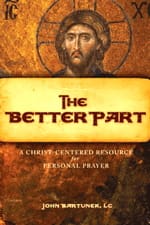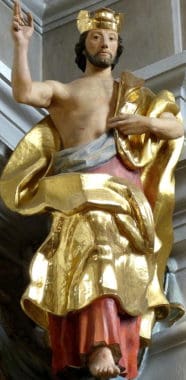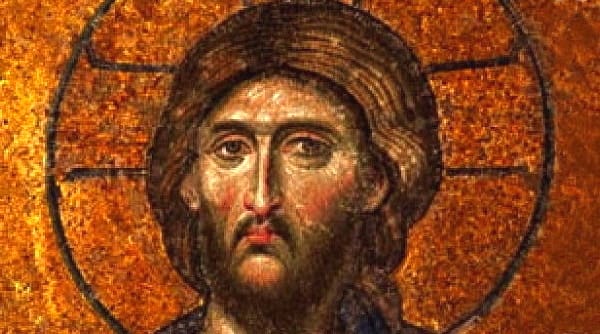“Jesus responded to the questions of the Roman governor affirming that he was King, but not of this world. He did not come to dominate peoples and territories, but to free men from the slavery of sin and be reconciled with God.” – Pope Benedict XVI
 John 18:28-40: They then led Jesus from the house of Caiaphas to the Praetorium. It was now morning. They did not go into the Praetorium themselves or they would be defiled and unable to eat. So Pilate came outside to them and said, ‘What charge do you bring against this man?’ They replied, ‘If he were not a criminal, we should not be handing him over to you’. Pilate said, ‘Take him yourselves, and try him by your own Law’. The Jews answered, ‘We are not allowed to put a man to death’. This was to fulfill the words Jesus had spoken indicating the way he was going to die. So Pilate went back into the Praetorium and called Jesus to him, ‘Are you the king of the Jews?’ he asked. Jesus replied, ‘Do you ask this of your own accord, or have others spoken to you about me?’ Pilate answered, ‘Am I a Jew? It is your own people and the chief priests who have handed you over to me: what have you done?’ Jesus replied, ‘Mine is not a kingdom of this world; if my kingdom were of this world, my men would have fought to prevent my being surrendered to the Jews. But my kingdom is not of this kind.’ ‘So you are a king then?’ said Pilate. ‘It is you who say it’ answered Jesus. ‘Yes, I am a king. I was born for this, I came into the world for this: to bear witness to the truth; and all who are on the side of truth listen to my voice.’ ‘Truth?’ said Pilate ‘What is that?’; and with that he went out again to the Jews and said, ‘I find no case against him. But according to a custom of yours I should release one prisoner at the Passover; would you like me, then, to release the king of the Jews?’ At this they shouted: ‘Not this man,’ they said ‘but Barabbas’. Barabbas was a brigand.
John 18:28-40: They then led Jesus from the house of Caiaphas to the Praetorium. It was now morning. They did not go into the Praetorium themselves or they would be defiled and unable to eat. So Pilate came outside to them and said, ‘What charge do you bring against this man?’ They replied, ‘If he were not a criminal, we should not be handing him over to you’. Pilate said, ‘Take him yourselves, and try him by your own Law’. The Jews answered, ‘We are not allowed to put a man to death’. This was to fulfill the words Jesus had spoken indicating the way he was going to die. So Pilate went back into the Praetorium and called Jesus to him, ‘Are you the king of the Jews?’ he asked. Jesus replied, ‘Do you ask this of your own accord, or have others spoken to you about me?’ Pilate answered, ‘Am I a Jew? It is your own people and the chief priests who have handed you over to me: what have you done?’ Jesus replied, ‘Mine is not a kingdom of this world; if my kingdom were of this world, my men would have fought to prevent my being surrendered to the Jews. But my kingdom is not of this kind.’ ‘So you are a king then?’ said Pilate. ‘It is you who say it’ answered Jesus. ‘Yes, I am a king. I was born for this, I came into the world for this: to bear witness to the truth; and all who are on the side of truth listen to my voice.’ ‘Truth?’ said Pilate ‘What is that?’; and with that he went out again to the Jews and said, ‘I find no case against him. But according to a custom of yours I should release one prisoner at the Passover; would you like me, then, to release the king of the Jews?’ At this they shouted: ‘Not this man,’ they said ‘but Barabbas’. Barabbas was a brigand.
Christ the Lord As the liturgical year reaches its conclusion with the Solemnity of Christ the King, by presenting us with this passage the Church shows us the stark contrast between Christ’s Kingdom and all other kingdoms. Pilate is the Roman Emperor’s representative in Palestine. His career as procurator had been marked by violence and political blunders, by which he alienated the Jews he was supposed to be ruling. Though he recognized Jesus’ innocence, he feared further conflict with the Jewish leaders, since that could cause them to denounce him to the emperor. Pilate is the typical earthly king, interested more in his personal career, prestige, and success than in what is true and right. Even when he finds himself face-to-face with the light of Truth itself, his own worldly ambitions blind him to it. We are sympathetic to him because we share his weakness.
Jesus, on the other hand, is fully identified with his Kingdom, the eternal Kingdom, established on the solid but hidden foundations of truth and divine love. His Kingdom is demanding but lasting. It involves obedience to the Father’s will, even at times to the point of sacrificing one’s earthly life. But it is the true Kingdom, the realm of meaning – deep, existential meaning – that abides. For the sake of this Kingdom, Jesus is willing to suffer rejection and injustice at the hands of an earthly king, because he knows that such a crime will only reveal more brilliantly the splendor of his Lordship. We are inspired by him because we know in our hearts that we are called to the same kind of nobility of spirit. We recognize that we cannot serve both Christ the King and the kings of this earth, and we are often torn between the two. Every such moment of decision (and there are plenty of them every day) presents us with a chance to renew our option for Christ, to confirm our citizenship in the Kingdom of God.
Christ the Teacher Pilate stands face-to-face with the Lord of the universe. They are having a conversation. No one can interrupt them. The cool morning air is refreshing. Pilate is agitated by the circumstances, but he is thinking clearly because it’s still early in the day. Jesus is exhausted from the first twelve hours of his Passion, but his eyes glow with the love and determination that had led him to this hour. His love for Pilate is no less because of his tiredness. He came to earth in order to save Pilate’s soul. Providence has brought them together. Jesus is eager to draw this Roman patrician close to his heart. All the conditions are right for Pilate to detect in Jesus the God for whom his heart longs. Yet he doesn’t. He is in the same room with Jesus, speaking with him, but he remains unmoved. Why?
“Everyone who belongs to the truth listens to my voice.” Here Jesus teaches us the secret to intimacy with God. Whoever lets himself be led by what is true will be drawn into communion with Christ and will hear and heed God’s ceaseless invitations to follow him more closely. But being led by truth requires humility. It requires recognizing a higher authority than oneself: if I am obliged to discover, accept, and conform to what is objectively true (morally, physically, historically), then I am not autonomous, I am not the master of my universe, I am not God. That act of humility, which frees us from the enervating bonds of selfishness, is hard to make. Our fallen human nature tends towards pride, towards self-sufficiency, control, and dominance. To resist that tendency requires courage. It takes courage to obey the truth and expose oneself to the burning love of God. May he grant it to us all in abundance.
 Christ the Friend “Mine is not a Kingdom of this world.” If it were, our friendship with Christ would be a lot easier than it sometimes is. He wants to lead us along the journey of life in this world towards our eternal home in heaven. Therefore, he often urges us to get up and move along when we are tired. He often asks us to take steep, demanding paths that we would prefer to avoid. But he knows the way, and he knows the destination. Like a true friend, he will never rest until we have reached the fullness of life – even if he has to put up with our complaining along the way.
Christ the Friend “Mine is not a Kingdom of this world.” If it were, our friendship with Christ would be a lot easier than it sometimes is. He wants to lead us along the journey of life in this world towards our eternal home in heaven. Therefore, he often urges us to get up and move along when we are tired. He often asks us to take steep, demanding paths that we would prefer to avoid. But he knows the way, and he knows the destination. Like a true friend, he will never rest until we have reached the fullness of life – even if he has to put up with our complaining along the way.
Pilate: Many things confused me that day, but nothing confused me more than the crowd’s choice to free Barabbas. Barabbas was a typical hotheaded revolutionary, a man who would kill or maim as easy as he would break a stick for the fire. But that Jesus was a noble man, a temperate man, a wise man. He had done nothing wrong. They were envious of him, that’s all. But why did the crowd choose Barabbas? How could they not see that Jesus was a worthy man? I can say this now, but the fact is that I acquiesced to their choice; I made the same horrible mistake. If I had been in Jesus’ place and he had been in my place, I know he never would have turned me over to that crowd. But he wasn’t in my place; I was in my place. Why did I give in? Why didn’t I stand my ground? I wish he hadn’t brought up all that talk about the truth. That disconcerted me. No one believes in truth anymore – that went out of fashion long ago. But when he said the word, it rang in my ears like the single clap of a small silver bell, clear and penetrating. It is still ringing. I can’t stop thinking about it. Why did I not listen to him? Why did I not trust him? Why did I not follow that voice that was speaking so clearly in me? Everything would be different if I had just done what I knew was right! Yet I know I can never undo what I did.
Christ in My Life Who is my king? Whom do I serve? I want to serve you, Lord, because you truly are the King. But I still tend so much to serve myself. I want people to do things my way – I want to have what I want, when I want it. I want my plans to work out exactly as I plan them. I guess all of this is natural, but you want to lead me to the supernatural realm. Renew my mind and heart, Lord; Thy will be done, not mine…
Every time I have followed your voice resounding in my conscience, I have experienced the peace and the satisfaction that comes from living in harmony with the truth. And every time I haven’t, I writhe and agonize. And yet I still haven’t learned, Lord. I still waffle. How do you put up with me? O Jesus, purify my heart, pour your love into my heart; with the courage of your heart, strengthen my heart…
Mary, I don’t want to be like Pilate. Why am I such a reluctant disciple? I know Jesus; I have been given a share in his mission – what greater privilege could I desire? And yet, sometimes I look at it as if it were a burden. The spirit of self-centeredness and fascination with the trinkets of this world still pulls at me. Mary, teach me to be his faithful friend, his brave soldier. Mother most pure, pray for me…
PS: This is just one of 303 units of Fr. John’s fantastic book The Better Part. To learn more about The Better Part or to purchase in print, Kindle or iPhone editions, click here. Also, please help us get these resources to people who do not have the funds or ability to acquire them by clicking here.
+
Art for this post on John 18:28-40: Cover of The Better Part used with permission. Detail of Statue of Christ the King (1962) by Paul Peschke, Wolfgang Sauber, 18 February 1014, own work, CCA-SA 3.0 Austria, Wikimedia Commons.


